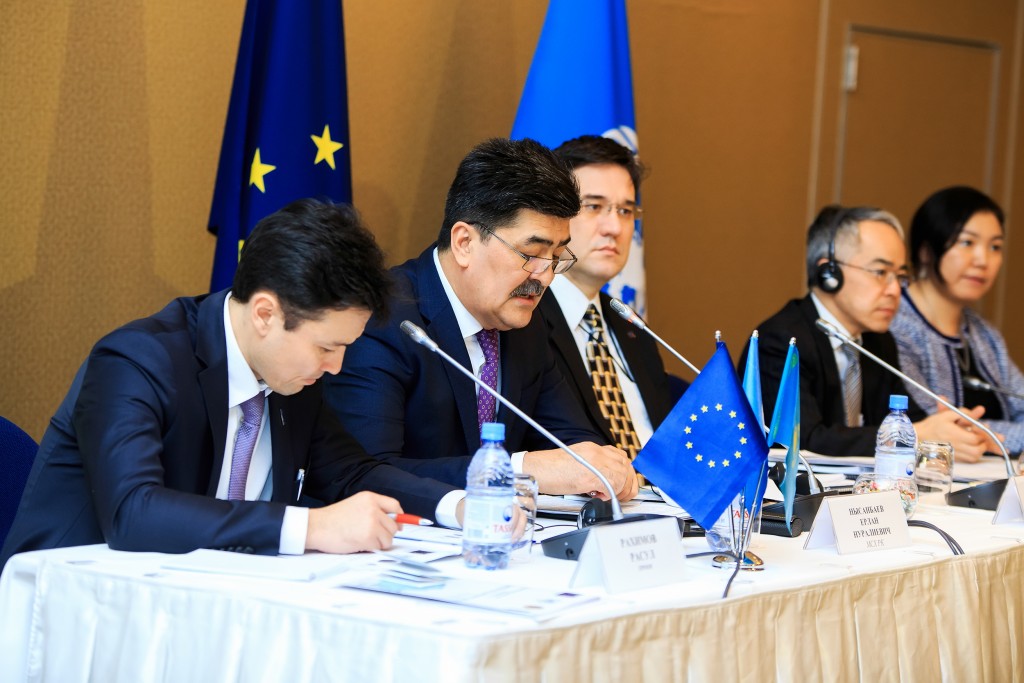ASTANA – Kazakhstan’s Green Economy Concept policy, adopted in May 2013, aims to diversify the economy through the careful use of natural resources. The effective use of water, identified as the key pillar of the national concept, has driven the start of the joint project, “Supporting Kazakhstan’s Transition to a Green Economy Model.”
The project, funded by the European Union and implemented by the UNDP and the UN Economic Commission for Europe (UNECE), was developed in close consultation with the Committee of Water Resources of Kazakhstan’s Ministry of Agriculture. The project goal is to contribute to the long-term, environmentally sustainable economic development of Kazakhstan by integrating best green practices and technologies in the water sector. The project’s duration is from 2015–2018.
Vice Minister of Agriculture of Kazakhstan Yerlan Nysanbayev supports the project “In the context of the green economy, the water sector provides a maximum contribution to the well-being of the population through food security, quality of drinking water and health. A green economy opens up additional opportunities for development and employment in the water sector. In the context of a green economy, the management of water sector ecosystem services, as well as social and economic factors, are taken into consideration.”
“Provision of water in sufficient quality and quantity is a matter of immediate concern to citizens, farmers and industry. Therefore, the EU, in close cooperation with the Committee for Water Resources of the Ministry of Agriculture of Kazakhstan, came to an agreement at the end of 2014 that led to this joint EU-UNDP-UNECE project supported by the EU in the amount of 7.1 million euros. The essential part of total project funding is allocated to pilot actions at the local level and I hope that EXPO 2017, which is 15 months from now, will be a great push to develop best practices and test innovations,” added head of the EU Delegation to Kazakhstan Ambassador Traian Hristea as he, Nysanbayev and other officials spoke at a Feb. 24 press conference presenting the project.
Within three years, the project aims to support the integration of green economy principles into the practical use of water and the implementation of international legislation. The project will also strengthen the capacity of local water resource management institutions, enhance cooperation on transboundary water management and develop practical recommendations for economic mechanisms on water use.
“Countries are taking ownership in integrating SDGs [Sustainable Development Goals] into their national development concepts. Kazakhstan already set effective water resources management as a priority in the national green economy concept in 2013. Kazakhstan’s intentions were supported by the UN and EU by initiating the joint project, ‘Supporting Kazakhstan’s Transition to a Green Economy Model,’ focused on efficiency of water management through the integration of green practices,” said Norimasa Shimomura, UN resident coordinator and UNDP resident representative at the press conference.
Water resources are essential assets, and effective water management is the shared economic responsibility of farms and factories, businesses and individuals, communities and industries. Therefore, the project will introduce new, effective ways of water infrastructure management, economic instruments of water supply and sanitation, and sustainable agriculture practices. Through the grant programme, 14 nongovernmental organisations are being supported to implement water saving projects in eight regions of Kazakhstan.
The overall objective of the project is to improve water management by making it economically and environmentally sustainable through the transition to a green economy. This complies with Kazakhstan’s 100 Concrete Steps developed by the government to improve economic growth, promote reform, develop local governance and enhance the role of local communities. These priorities are also in line with the global Sustainable Development Goals. The project will help achieve a number of goals, among them ensuring sustainable economic growth, energy efficiency, smart water management, reduced inequality and improved health and wellbeing.

